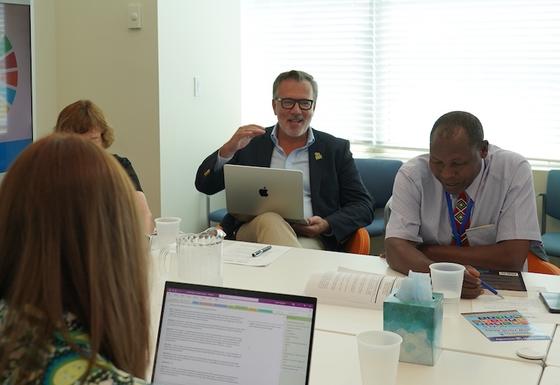Alpaslan Özerdem, dean of George Mason University’s Carter School for Peace and Conflict Resolution, recently participated in discussions at the 2025 Global Higher Education Symposium, held at the United Nations Headquarters in New York on July 18.
Özerdem was invited in his capacity as the chair of the United Nations Academic Impact Hub for Sustainable Development Goal 16: Peace, Justice, and Strong Institutions—a leadership role held by the Carter School through 2027. At the invitation-only symposium, thought leaders were discussing UNESCO’s Reimagining our futures together: A new social contract for education report, which asks three guiding questions to help envision education beyond 2050: What should we continue doing? What should we abandon? And, what needs to be creatively invented afresh?
A high-level dialogue focused on rethinking the purpose and design of higher education in light of rapid global change, Özerdem emphasized that in an era marked by political volatility and deepening societal divisions, higher education institutions must rise to the challenge of becoming credible and reliable partners to the public.

“As universities, we hold a distinct and urgent responsibility—not only to foster democratic values but also to help rebuild public trust by championing truth, transparency, and the integrity of knowledge,” he said.
The symposium highlighted the potential of universities to play a far more prominent role in shaping the future. As articulated in the group’s consensus statement, “Higher education institutions can demonstrate responsible leadership that anticipates and addresses long-term individual and collective readiness for economic, environmental, and social challenges—including climate resilience, peacebuilding, and community impact.”
The SDG16 Hub is a global initiative that brings together universities, scholars, and students to advance more peaceful, just, and inclusive societies. Under the Carter School’s leadership, the hub collaborates with three vice chairs—the University of Oxford (UK), University for Peace (Costa Rica), and Narxoz University (Kazakhstan).
George Mason’s engagement in this high-level platform further cements its reputation as a thought leader in peace and conflict resolution, while opening exciting new pathways for research collaboration, student engagement, and global visibility. As the first school in the United States serving as a hub chair, the Carter School represents the George Mason community on the world stage and contributes to shaping the next social contract for education—one that places peace, justice, and human dignity at its core.
